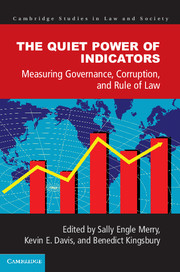Book contents
- Frontmatter
- Contents
- Notes on Contributors
- Acknowledgments
- Introduction: The Local-Global Life of Indicators: Law, Power, and Resistance
- PART I GLOBAL INDICATORS OF GOVERNANCE, CORRUPTION, AND RULE OF LAW
- Part II INDICATORS IN LOCAL CONTEXTS
- 6 Rule of Law Indicators as a Technology of Power in Romania
- 7 Indicators, Global Expertise, and a Local Political Drama: Producing and Deploying Corruption Perception Data in Post-Socialist Albania
- 8 Evaluating the Impact of Corruption Indicators on Governance Discourses in Kenya
- 9 Measuring Labor Market Efficiency: Indicators that Fuel an Ideological War and Undermine Social Concern and Trust in the South African Regulatory Process
- 10 Conclusion: Contesting Global Indicators
- Index
- Books in the Series
- References
6 - Rule of Law Indicators as a Technology of Power in Romania
from Part II - INDICATORS IN LOCAL CONTEXTS
Published online by Cambridge University Press: 05 June 2015
- Frontmatter
- Contents
- Notes on Contributors
- Acknowledgments
- Introduction: The Local-Global Life of Indicators: Law, Power, and Resistance
- PART I GLOBAL INDICATORS OF GOVERNANCE, CORRUPTION, AND RULE OF LAW
- Part II INDICATORS IN LOCAL CONTEXTS
- 6 Rule of Law Indicators as a Technology of Power in Romania
- 7 Indicators, Global Expertise, and a Local Political Drama: Producing and Deploying Corruption Perception Data in Post-Socialist Albania
- 8 Evaluating the Impact of Corruption Indicators on Governance Discourses in Kenya
- 9 Measuring Labor Market Efficiency: Indicators that Fuel an Ideological War and Undermine Social Concern and Trust in the South African Regulatory Process
- 10 Conclusion: Contesting Global Indicators
- Index
- Books in the Series
- References
Summary
INTRODUCTION
On July 18, 2012, the European Commission issued its regular biannual report regarding Romania's progress on the reform of the justice system and anticorruption efforts. In light of the country's recent political turf battles between the prime minister, the president, and the judiciary, the report excoriated Romania's leadership and questioned the country's “commitment to the respect of the rule of law or the understanding of the meaning of the rule of law in a pluralist democratic system” (European Commission [EC] 2012, 3). Unlike prior reports, the July report summarized five years of monitoring; also unlike prior reports, it included for the first time, albeit in footnotes, references to the country's rankings according to Transparency International (TI), Freedom House, and the World Bank's World Governance Indicators.
The report illustrates well the use of rule of law indicators as a disciplinary mechanism in the Romanian context, in particular as it signals the country's ambiguous place among other EU members. This chapter examines the use of rule of law indicators as a political technology of power in Romania, to understand how indicators in general are received, contested, or resisted around the world. The theoretical framework informing the chapter is Michel Foucault's governmentality concept. Rule of law indicators are relative newcomers on the global rule of law scene, but they are increasingly popular because they promise simplification, efficiency, transparency, consistency, scientificity, objectivity, impartiality, and standard setting and evaluation, all to further better governance (Davis, Kingsbury, and Merry 2011). Despite variations among them, rule of law indicators make a common set of promises: that they can encapsulate a complex reality – the rule of law– in a number or set of numbers that embodies the rule of law reformers' dreams of the past forty years.
Yet not all indicators are created equal as far as the intended beneficiaries of indicators are concerned, and it is not yet clear how they are being used.
- Type
- Chapter
- Information
- The Quiet Power of IndicatorsMeasuring Governance, Corruption, and Rule of Law, pp. 199 - 221Publisher: Cambridge University PressPrint publication year: 2015
References
- 13
- Cited by



